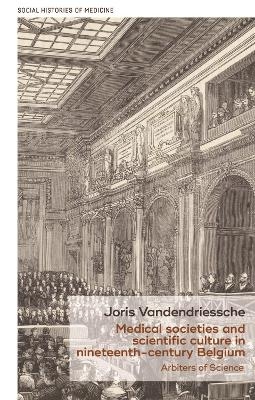
Medical Societies and Scientific Culture in Nineteenth-Century Belgium
Seiten
2018
Manchester University Press (Verlag)
978-1-5261-3320-5 (ISBN)
Manchester University Press (Verlag)
978-1-5261-3320-5 (ISBN)
This book analyses how nineteenth-century doctors gathered in medical societies to discuss, evaluate, publish and celebrate their studies. It reveals how the codes of conduct that regulated scientific practice corresponded to the values of social engagement, polite debate and a free press of the urban bourgeoisie. -- .
This book offers the first comprehensive study of nineteenth-century medical societies as scientific institutions. It analyses how physicians gathered to share, discuss, evaluate, publish and even celebrate their studies, uncovering the codes of conduct that underpinned these activities. The book discusses the publishing procedures of medical journals, the tradition of oratory in academies, the networks of anatomists and the commemorations of famous physicians such as Vesalius. Its setting is nineteenth-century Belgium, a young nation state in which the freedoms of press and association were constitutionally established. The book shows how Belgian physicians participated in a civil society shaped by the values of social engagement, polite debate and a free press. Given its broad focus on science, sociability and citizenship, it will be of interest to all those seeking to understand the position of science in nineteenth-century society. -- .
This book offers the first comprehensive study of nineteenth-century medical societies as scientific institutions. It analyses how physicians gathered to share, discuss, evaluate, publish and even celebrate their studies, uncovering the codes of conduct that underpinned these activities. The book discusses the publishing procedures of medical journals, the tradition of oratory in academies, the networks of anatomists and the commemorations of famous physicians such as Vesalius. Its setting is nineteenth-century Belgium, a young nation state in which the freedoms of press and association were constitutionally established. The book shows how Belgian physicians participated in a civil society shaped by the values of social engagement, polite debate and a free press. Given its broad focus on science, sociability and citizenship, it will be of interest to all those seeking to understand the position of science in nineteenth-century society. -- .
Joris Vandendriessche is a Postdoctoral Researcher at the Cultural History since 1750 Research Group of the University of Leuven, and Fellow of the Research Foundation - Flanders -- .
Introduction
1 Sociability and medical reform
2 Debate and controversy
3 Publishing and editing
4 Networks and collections
5 Expertise and advice
6 Celebrating and commemorating
7 A new scientific landscape
Conclusions
Select Bibliography
Index -- .
| Erscheinungsdatum | 23.02.2019 |
|---|---|
| Reihe/Serie | Social Histories of Medicine |
| Zusatzinfo | 11 black & white illustrations |
| Verlagsort | Manchester |
| Sprache | englisch |
| Maße | 138 x 216 mm |
| Gewicht | 531 g |
| Themenwelt | Geschichte ► Allgemeine Geschichte ► Neuzeit (bis 1918) |
| Geisteswissenschaften ► Geschichte ► Regional- / Ländergeschichte | |
| Geschichte ► Teilgebiete der Geschichte ► Kulturgeschichte | |
| Studium ► Querschnittsbereiche ► Geschichte / Ethik der Medizin | |
| Naturwissenschaften | |
| ISBN-10 | 1-5261-3320-2 / 1526133202 |
| ISBN-13 | 978-1-5261-3320-5 / 9781526133205 |
| Zustand | Neuware |
| Informationen gemäß Produktsicherheitsverordnung (GPSR) | |
| Haben Sie eine Frage zum Produkt? |
Mehr entdecken
aus dem Bereich
aus dem Bereich
Giordano Bruno - ein ketzerisches Leben
Buch | Hardcover (2024)
C.H.Beck (Verlag)
29,90 €
das dramatische 16. Jahrhundert
Buch | Hardcover (2024)
Rowohlt Berlin (Verlag)
34,00 €
die Fahrt der Bounty und die globale Wirtschaft im 18. Jahrhundert
Buch | Hardcover (2024)
Klett-Cotta (Verlag)
25,00 €


